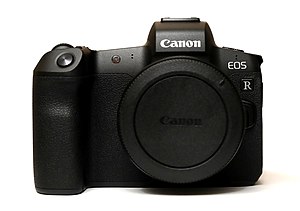 EOS R camera body with EF lens adapter | |
| Overview | |
|---|---|
| Maker | Canon Inc. |
| Type | Mirrorless interchangeable lens camera |
| Released | 9 October 2018[1] |
| Intro price | $2299 (body only)[2] |
| Lens | |
| Lens mount | Canon RF |
| Sensor/medium | |
| Sensor | dual-pixel CMOS sensor[3] |
| Sensor size | Full-frame (36 × 24 mm) |
| Maximum resolution | 6.720 × 4.480 pixels (30.1 MP) |
| Film speed | ISO 100 – 40,000 expandable to 102,400 |
| Recording medium | SDXC (UHS-II capable) |
| Focusing | |
| Focus | Dual Pixel CMOS autofocus |
| Flash | |
| Flash exposure compensation | ± 3 stops in 1/3- or 1/2-stop increments |
| Shutter | |
| Frame rate | 8 fps |
| Shutter speeds | 30 s to 1/8000 s |
| Viewfinder | |
| Viewfinder | 3.69-million dot OLED EVF |
| Image processing | |
| Image processor | DIGIC 8 |
| General | |
| Video recording | 4K resolution (30 fps) |
| LCD screen | 3.2 in 2.1-million-dot LCD |
| Battery | LP-E6N,[4] LP-E6,[4] LP-E6NH[5] |
| Data Port(s) | Wi-Fi, Bluetooth |
| Dimensions | 135.8 mm × 98.3 mm × 84.4 mm (5.35 in × 3.87 in × 3.32 in)[6] |
| Weight | 580 g (20 oz) (body only),[7] 660 g (23 oz) (incl. battery and memory card)[7] |
| Made in | Japan |
The Canon EOS R is the first full-frame mirrorless interchangeable-lens camera (MILC) produced by Canon. It was announced days after Nikon's first full-frame MILC, the Nikon Z 7, and five years after Sony's first, and was released in October 2018. The camera is the first of Canon's new EOS R system, and the first to use the RF lens mount. The "R" stands for "Reimagine optical excellence".
The EOS R features a 30.3 megapixel CMOS sensor, an OLED viewfinder and an articulating LCD touchscreen. Autofocus uses dual-pixel technology, and "Eye Detection AF" automatically focuses on human faces within the scene. The mechanical shutter can capture still images at up to eight frames per second, and cropped-sensor 4K video capture is supported at 30 fps. The EOS R uniquely offers a "Multi-function Bar", a configurable touch-sensitive strip. The EOS R also introduced the "Flexible Priority Exposure" ("Fv") mode. Adapters are available to allow mounting of older lenses which require the EF lens mount. Canon also released an astrophotography variant named EOS Ra, which uses a modified IR cut-off filter to allow more H-alpha light to be captured, and offers stronger digital magnification, but is otherwise identical to the EOS R.
The Canon EOS R was received with mixed reviews, and compared unfavourably to the Nikon Z 6 and the Sony α7 III, though there was praise for the EOS R's autofocus and image quality, and for the RF lenses launched with it. The Multi-function Bar was roundly dismissed by critics as a failure. The EOS R was later unofficially discontinued and listed as "no longer in production" on the official Canon site.
- ^ Wilson, Mark (5 September 2018). "Canon EOS R: all you need to know about Canon's full-frame mirrorless camera". Trusted Reviews. Archived from the original on 1 March 2024. Retrieved 1 March 2024.
- ^ Cite error: The named reference
EOSR_dpreview_page1was invoked but never defined (see the help page). - ^ Cite error: The named reference
dpreview_overviewwas invoked but never defined (see the help page). - ^ a b Cite error: The named reference
Canon_EOSR_advanced_user_guidewas invoked but never defined (see the help page). - ^ "Canon LP-E6NH Battery Pack". Canon UK Store. Archived from the original on 21 December 2020. Retrieved 14 December 2020.
- ^ "EOS R System" (PDF). Canon USA. 2018. Archived (PDF) from the original on 2 February 2021. Retrieved 22 October 2020.
- ^ a b "Specifications & Features — EOS R". Canon UK. Archived from the original on 1 March 2024. Retrieved 1 March 2024.